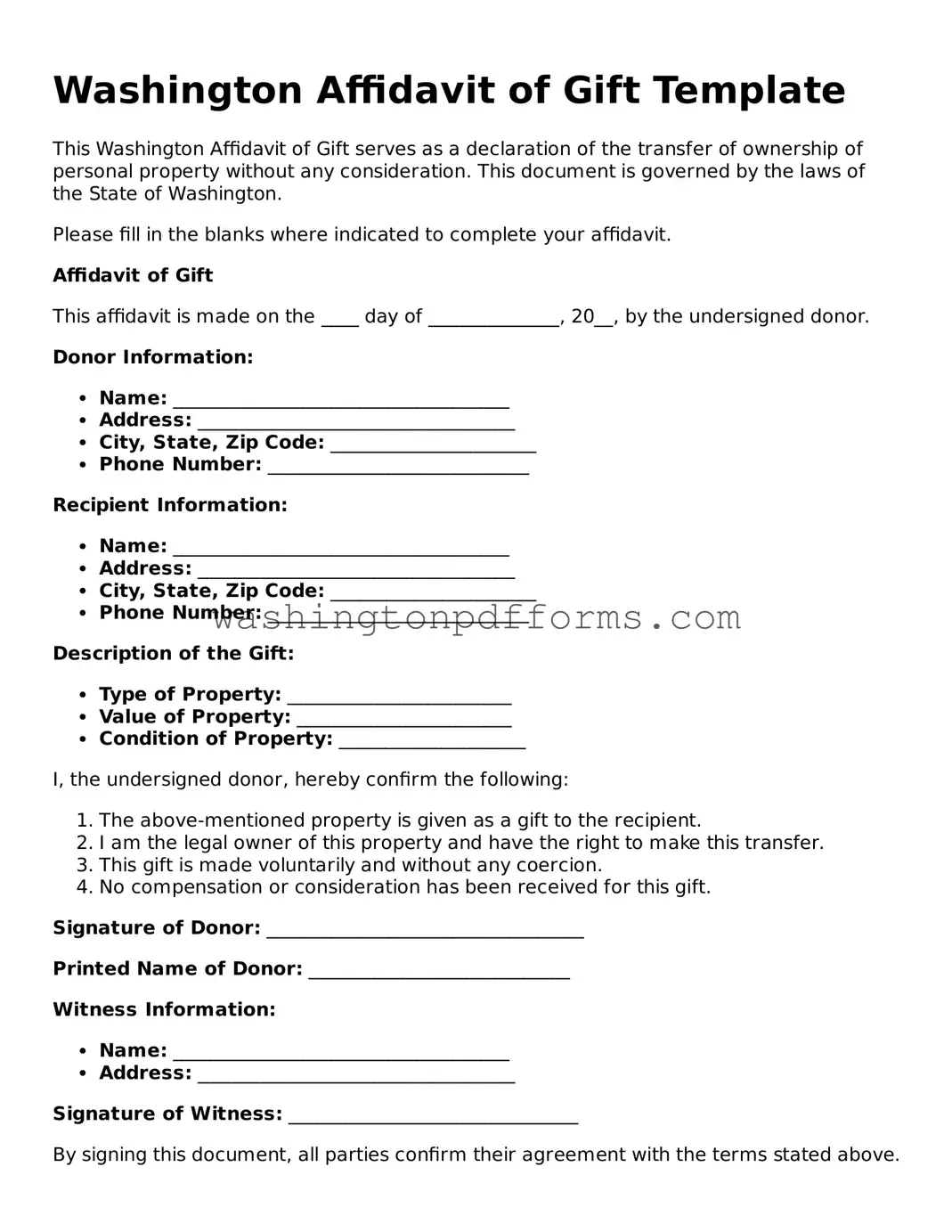Attorney-Approved Washington Affidavit of Gift Template
In the realm of personal and estate planning, the Washington Affidavit of Gift form plays a pivotal role in facilitating the transfer of property without the complexities often associated with formal sales. This straightforward document serves as a declaration by the donor, affirming their intention to gift property to a recipient, typically without any expectation of compensation. By utilizing this form, individuals can simplify the process of transferring ownership, ensuring that both parties are clear on the terms of the gift. It captures essential details such as the description of the property being gifted, the identities of both the donor and the recipient, and the date of the transaction. Additionally, the affidavit is often accompanied by the signatures of witnesses, which adds a layer of legitimacy and can help prevent disputes in the future. Understanding the nuances of this form is crucial for anyone considering a gift of property in Washington, as it not only streamlines the transfer process but also provides legal protection for both the giver and the receiver.
Common mistakes
When filling out the Washington Affidavit of Gift form, many individuals make common mistakes that can lead to delays or complications. One frequent error is neglecting to provide complete information. Each section of the form requires specific details. Leaving any part blank can raise questions and may result in the form being rejected.
Another mistake often seen is failing to sign the affidavit. Signatures are crucial as they validate the document. Without a signature, the form lacks authenticity and may not be considered legally binding.
People also sometimes confuse the names of the donor and recipient. It’s essential to clearly identify who is giving the gift and who is receiving it. Misidentifying these parties can lead to legal issues down the line.
Additionally, some individuals do not date the form correctly. A date is necessary to establish when the gift was made. If the date is missing or incorrect, it can complicate matters regarding the timing of the gift.
Inaccurate descriptions of the gift itself are another common pitfall. The affidavit should include a detailed description of the item being gifted. Vague descriptions can lead to misunderstandings about what was actually given.
People often overlook the requirement for witnesses. In Washington, certain gifts need to be witnessed to be valid. Not having the proper number of witnesses can invalidate the affidavit.
Another mistake is not providing the correct identification for both the donor and recipient. Identification numbers, such as Social Security numbers or driver’s license numbers, may be required. Omitting this information can hinder the processing of the form.
Some individuals fail to check for updates or changes in the form itself. Laws and requirements can change, and using an outdated version of the form can lead to errors. Always ensure that the most current form is being used.
Moreover, people sometimes do not keep a copy of the completed affidavit for their records. It’s wise to maintain a copy for future reference. This can be helpful in case any disputes arise regarding the gift.
Lastly, individuals may not seek assistance when needed. If there’s uncertainty about how to fill out the form, consulting a legal professional can provide clarity. Ignoring this step can lead to mistakes that could have been easily avoided.
Similar forms
- Bill of Sale: This document serves as proof of transfer of ownership of personal property. Like the Affidavit of Gift, it requires the seller to affirm that they are the rightful owner and have the authority to sell the item. Both documents emphasize the voluntary nature of the transaction.
- Gift Deed: A Gift Deed formalizes the transfer of property without any exchange of money. Similar to the Affidavit of Gift, it includes a declaration by the donor affirming their intent to give the property as a gift. Both documents are typically signed in the presence of witnesses to ensure validity.
BBB Complaint Form: The OnlineLawDocs.com provides a resource for consumers to utilize the standardized BBB Complaint Form, facilitating the process of addressing business grievances and enhancing trust in commercial interactions.
- Transfer of Title: This document is used to officially transfer ownership of a vehicle or real estate. Like the Affidavit of Gift, it requires the current owner to declare their intent to transfer ownership. Both documents must often be filed with a government entity to finalize the transfer.
- Power of Attorney: While primarily used to grant authority to another person to act on one's behalf, a Power of Attorney can also include provisions for gifting. Similar to the Affidavit of Gift, it requires clear consent and intent from the principal, ensuring that the actions taken are in line with their wishes.
Some Other Washington Templates
Divorce Washington State - The Divorce Settlement Agreement can sometimes be modified if both parties consent.
A Texas Bill of Sale is a legal document that serves as proof of the transfer of ownership of personal property from one party to another. This form is essential for recording the sale of items such as vehicles, furniture, and equipment. Using this document helps protect both the buyer and seller, ensuring that the transaction is clear and legally binding. For more information, visit https://topformsonline.com/texas-bill-of-sale.
Washington State Articles of Incorporation - The form includes essential information about the corporation’s name.
